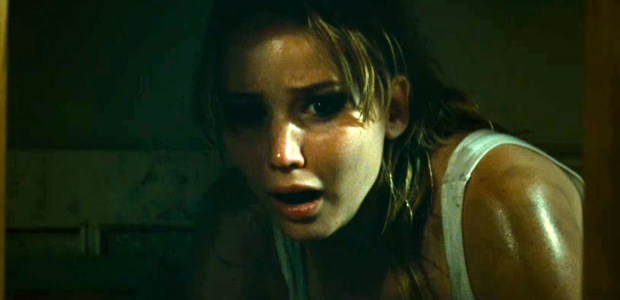If you need a reason to believe horror films are becoming an unpopular genre, look no further than House At The End of The Street — an abysmal excuse of a movie which is boring too, just like its unimaginative title. Be it at the end of the street or on the edge of the forest or on top of a hill, a desolate house is a fertile breeding ground for urban legend; the only exception here is this house has an unfair share of borrowed secrets. Using a fraction of this premise to create the rest of the story, director Mark Tonderai tries his hand at shock and suspense. Instead, what you get is schlock and silage.
Here’s more of the story: owing to its dark history, our titular house is no longer prime property so it’s no surprise when nearby houses in the vicinity loose market value. This is when single-mother Sarah Cassidy (Elisabeth Shue) and daughter Elissa (Jennifer Lawrence) move into their dream house, literally a stone’s throw away from our house of horrors. Soon after moving in, Sarah and Elissa learn that the titular house is the scene of a double homicide in which a little girl brutally killed her parents. With rumors amok that the girl is missing since said incident and presumed dead, sole survivor and elder brother Ryan (Max Thieriot) continues to live in the house, alone. For obvious reasons, and the resulting depreciated real estate value, Ryan is despised by the townsfolk. Elissa is the only person who is charmed by Ryan but as they begin a relationship, Ryan opens up and digs into the past, thus revealing the incident leading up to his sister going berserk. What he doesn’t reveal is the dark secret in the basement of his house.
It’s no spoiler to say that Thieriot’s Ryan is hiding something in his basement. Of course, in revealing this secret—or the film’s diabolical twist—director Mark Tonderai attempts a blind-sided punch. The problem is that punch doesn’t land because it lacks aim and adequate power to reach its target, the audience. Sadly, this twist is the final nail to the coffin because it is revealed very late in the final act and secondly, the buildup is filled with predictability arising from a cliché-ridden plot where originality takes a back seat. Everything the film throws at viewers are has-been scare tactics borrowed from genre defining horror movies. Easily identifiable is the muted silence before a jumpy (and loud) scene, a scantily clad female protagonist more curious than a cat, and an antagonist with more lives than said cat.
Even if you accept this as the expected norm in contemporary horror films, Tonderai’s epic failure is in the wafer thin story made worse by formulaic characterization. Although gorgeous and talented, as Elissa, Lawrence is reduced to the role of a stereotypical dumb blonde who is too independent for her own good. A cliché in itself considering blondes are usually the first to go in horror movies. Where was that sliver of fiery persistence we loved about her in Winter’s Bone? Lost between paychecks, I presume. Thieriot’s Ryan on the other hand, turns out bland and underdeveloped: a shame considering his character had the potential to turn this movie around. In all this ho-hum mishmash, the upside is that Elisabeth Shue’s Sarah manages to throw in an age old phrase: “Mother is always right!” Trust me, only Norman Bates would approve.
Rating: 




